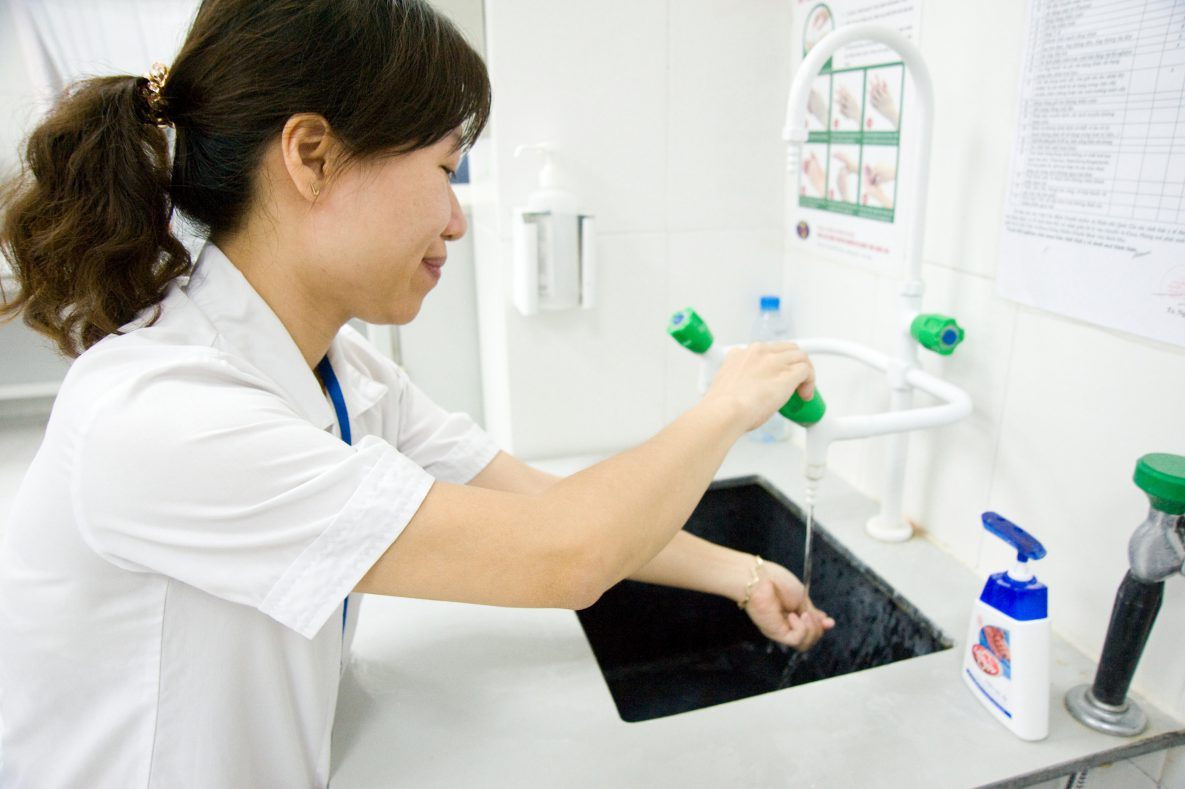Vietnam Tracks Multi-drug Resistant Bacteria

Maintaining hand hygiene is one aspect of (IPC) practices, which are critical to stopping the spread of resistant germs in healthcare settings
The Bottom Line
The challenge: High levels of antimicrobial resistance are found in every region of the world, threatening our ability to treat even the most common infectious diseases.
The solution: CDC is supporting Vietnam in tracking multi-drug resistant infections in hospitals as part of the country’s National Action Plan – a critical step in monitoring the spread of antibiotic resistant bacteria.
In Vietnam, rates of antimicrobial resistance (AMR) are among the highest in Asia, with multi-drug-resistant infections causing thousands of deaths annually. The region has recently seen the emergence of serious antimicrobial resistance in tuberculosis, malaria, and bacteria commonly associated with hospital-acquired infections (HAI).
To combat AMR, CDC’s work with countries focuses on:
- Creating sound national policies
- Strengthening AMR surveillance
- Developing and deploying infection control strategies
- Establishing antibiotic stewardship programs to improve the appropriate use of antibiotics
Detecting, preventing, and controlling drug resistance requires coordinated efforts from all countries. CDC collaborates with WHO-Vietnam, Oxford Clinical Research Unit, Association of Public Health Laboratories, and PATH to directly support implementation of Vietnam’s National Action Plan to Combat Antimicrobial Resistance.
Because detecting and tracking dangerous infections is key to stopping AMR, Vietnam’s National Action Plan includes an AMR sentinel surveillance system involving 16 laboratories and six model hospitals. The system tracks and reports levels of healthcare-associated bloodstream infections and urinary tract infections. Vietnam’s National Action Plan also includes monitoring the use of antibiotics while encouraging antibiotic stewardship, as well as developing regulations that will protect human and animal health.
Proper infection prevention and control (IPC) practices are also critical to stopping spread of resistant germs in healthcare settings; a “champions” initiative strengthens these practices among healthcare workers by training a core group of professionals who can then train others.
The AMR sentinel surveillance system is the first national surveillance for multi-drug resistant bacteria in the country. This is a critical step in monitoring the spread of antibiotic resistant bacteria.
The country has also assessed the quality and capacity of their AMR surveillance laboratories and has provided training and mentoring for selected labs. At the national level, Vietnam now has guidelines for microbiology and antibiotic susceptibility testing. They also have a national program to build capacity in infection prevention and control.
Although Vietnam has made significant progress in setting policies to combat AMR, there is much to be done to better detect and prevent resistant germs, both in and outside of healthcare settings. Ensuring that every country is able to rapidly and effectively detect AMR is critical to protecting the health of the global community.
About This Story
CDC is working with 31 priority countries to develop global health security capabilities, which protect Americans and people around the world from disease threats. This story illustrates Vietnam’s commitment to:
- Antimicrobial Resistance (AMR): Developing a national plan to strengthen surveillance and laboratory ability to detect drug-resistant pathogens, such as bacteria and viruses.
- Real-Time Surveillance: Launching and strengthening global networks of disease-surveillance systems that quickly detect outbreaks and assess risks.